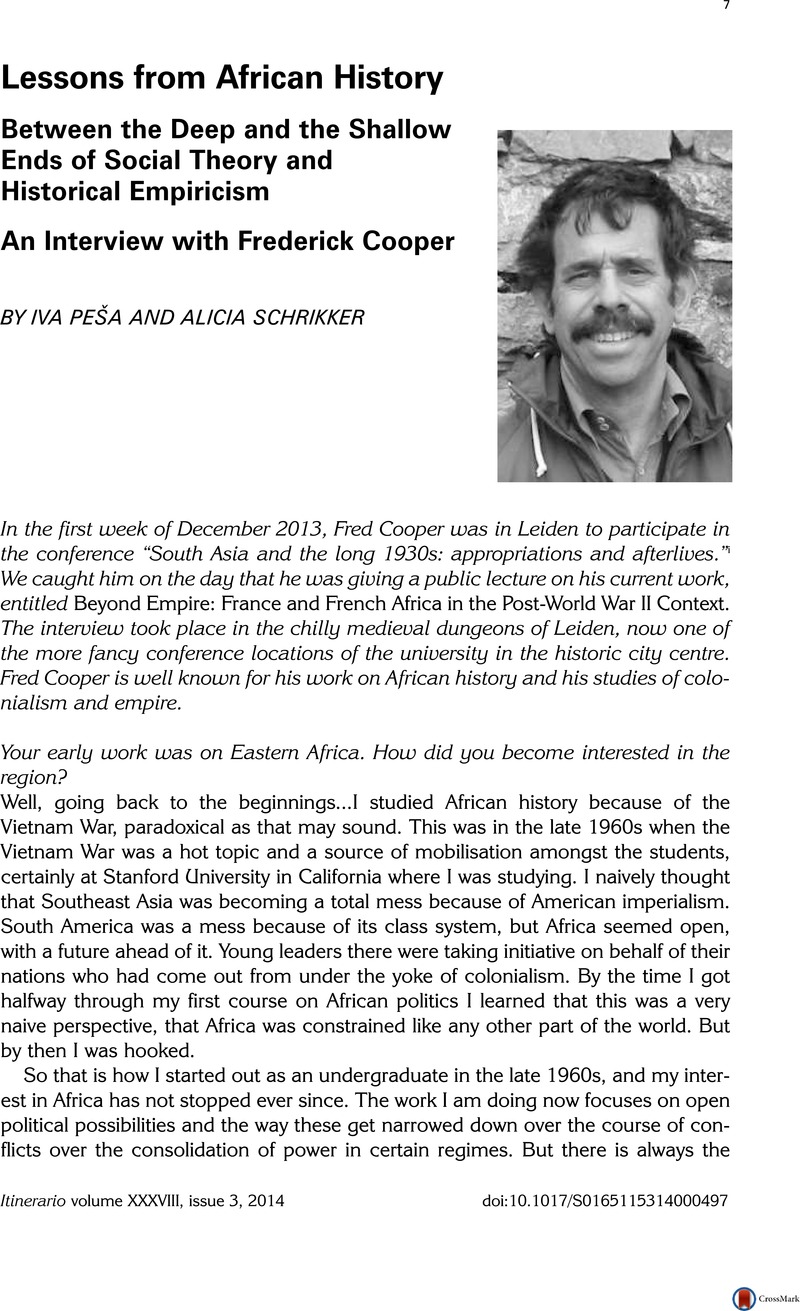No CrossRef data available.
Published online by Cambridge University Press: 09 January 2015

1 For a report on this conference see Stolte, C. and Sunderason, S. in IIAS Newsletter, spring 2014: http://www.iias.nl/the-newsletter/article/south-asia-and-long-1930s-appropria-tions-and-afterlivesGoogle Scholar.
2 His most famous novels are A Grain of Wheat (1967) and Petals of Blood (1977). He fell into disgrace with the Kenyatta regime after writing the critical play Ngaahika Ndeenda (1977). He was detained without trial and his books were forbidden. After his release he taught at various universities in the US.
3 Daniel Arap Moi ruled as president between 1978 and 2002. For a history of post-independence Kenya, see Branch, Daniel, Kenya between Hope and Despair, 1963-2011 (New Haven: Yale University Press, 2011)Google Scholar.
4 Kitching, G., “Politics, Method and Evidence in the Kenya Debate,” in Bernstein, H. and Campbell, B., eds., Contradictions of Accumulation in Africa: Studies in Economy and State (Berkeley: Sage, 1985)Google Scholar.
5 Cooper, Frederick, From Slaves to Squatters: Plantation Labor and Agriculture in Zanzibar and Coastal Kenya, 1890-1925 (New Haven: Yale University Press, 1980)Google Scholar; Plantation Slavery on the East Coast of Africa (New Haven: Yale University Press, 1977)Google Scholar.
6 Cooper, Frederick, On the African Waterfront: Urban Disorder and the Transformation of Work in Colonial Mombasa (New Haven: Yale University Press, 1987)Google Scholar.
7 Cooper, Frederick, Decolonization and African Society: The Labor Question in French and British Africa (Cambridge: Cambridge University Press, 1996). Also in French translationCrossRefGoogle Scholar.
8 Mamadou Diouf is now Leitner Professor of African Studies at Columbia University.
9 Mohammed Mbodj formerly taught at the Université Cheikh Anta Diop in Dakar and is now at Manhattanville College in New York.
10 Babacar Fall teaches at the Ecole Normale Supérieure, part of the Université Cheikh Anta Diop in Dakar.
11 Genovese, Eugene, The Political Economy of Slavery: Studies in the Economy and the Society of the Slave South (Middletown: Wesleyan University Press, 1965)Google Scholar.
12 Woodward, C. Vann, The Origins of the New South, 1877-1913 (Baton Rouge: Louisiana State University Press, 1971)Google Scholar.
13 Davies, Sam, Davis, Colin J., van Voss, Lex Heerma, Hesselink, Lidewij, de Vries, David, and Weinhauer, Klaus, eds., Dock Workers: International Explorations in Comparative Labour History, 1790-1970. 2 vols. (Farnham: Ashgate, 2000)Google Scholar.
14 For two interventions into the relationship of capitalism and Africa, done at two different career stages, see “Africa and the World Economy,” African Studies Review 24:2/3 (1981): 1–86CrossRefGoogle Scholar, and Africa in the World: Capitalism, Empire, Nation-State (Cambridge: Harvard University Press, 2014), chapter 1Google Scholar.
15 Stoler, Ann L., Capitalism and Confrontation in Sumatra's Plantation Belt, 1870-1979 (New Haven: Yale University Press, 1985)Google Scholar.
16 See American Ethnologist 16:4 (1989)Google Scholar. Contributors were, apart from Ann Stoler and Frederick Cooper, Partha Chatterjee, John L. Comaroff, Randall M. Packard, Michel-Rolph Troillot, and Scot Atran.
17 Cooper, Frederick and Stoler, Ann, Tensions of Empire: Colonial Cultures in a Bourgeois World (Berkeley: University of California Press, 1997)CrossRefGoogle Scholar.
18 Burbank, Jane and Cooper, Frederick, Empires in World History, Power and the Politics of Difference (Princeton: Princeton University Press, 2010)Google Scholar.
19 Senghor, Léopold Sédar, Négritude et Humanisme (Paris: Editions du Seuil, 1964)Google Scholar. Senghor (1906-2001) was a Senegalese poet, philosopher, writer, and president (1960-80).
20 Genovese, Eugene, Roll, Jordan, Roll: The World the Slaves Made (New York: Pantheon Books, 1974)Google Scholar.
21 Davis, David Brion, The Problem of Slavery in Western Culture (Ithaca: Cornell University Press, 1966)Google Scholar; The Problem of Slavery in the Age of Revolution (Ithaca: Cornell University Press, 1975)Google Scholar.
22 da Costa, Emilia Viotti, The Brazilian Empire: Myths and Histories (Chicago: University of Chicago Press, 1985)Google Scholar.
23 Such a tendency can be called “the conformism of the avant-garde.” See Cooper, Frederick, Colonialism in Question: Theory, Knowledge, History (Berkeley: University of California Press, 2005). Also in French translationGoogle Scholar.
24 Cooper, Frederick, Citizenship between Empire and Nation: Remaking France and French Africa, 1945-1960 (Princeton: Princeton University Press, 2014CrossRefGoogle Scholar; also in French translation), and Africa in the World (see above, note 14).